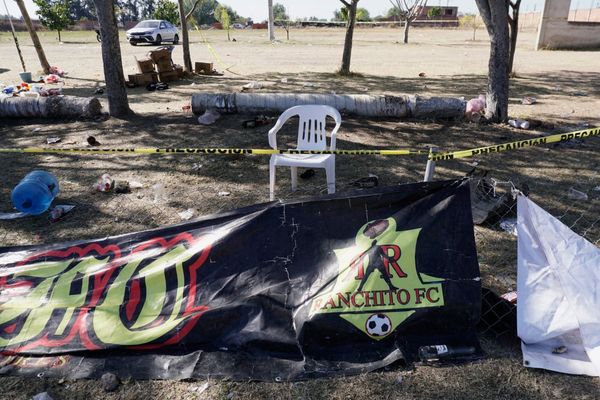
Prince’s Purple Rain album had been bought by 11 million Americans by May 1985. One of them was 11-year-old Karenna Gore. Back home, Karenna’s mother was shocked to hear Prince sing, on the album’s fifth track Darling Nikki: “I knew a girl named Nikki / I guess you could say she was a sex fiend / I met her in a hotel lobby/ masturbating with a magazine.”
“I couldn’t believe my ears,” said Karenna’s mother, Tipper Gore. “The vulgar lyrics embarrassed both of us. At first, I was stunned – then I got mad!”
Parents getting upset by their offspring’s musical enthusiasms is nothing new, but Tipper was no ordinary Tennessee mum– she was married to rising Democrat politician Senator Al Gore. Determined to do something, Tipper reached across the Democrat-Republican divide to Susan Baker, wife of James Baker, the treasury secretary under Ronald Reagan. They brought in two more women and co-founded the Parents Music Resource Center (PMRC). As all four women had husbands with strong connections to government, the US media dubbed the committee “the Washington wives”.
The PMRC organised a US Senate hearing for September 1985, its aim to increase parental controls over recorded music. Even before hearings began the PMRC had remarkable momentum: funding came from Beach Boys vocalist Mike Love and Joseph Coors, owner of Coors beer, both active Reagan supporters, and the committee gained considerable media coverage, earning support from the likes of Jerry Falwell, US televangelist and co-founder of the Moral Majority. The campaign arrived at a favourable time. While video nasties served as folk devils in the UK, in the US Ronald Reagan’s emphasis on “family values” had empowered the religious right: with the surging popularity of MTV, the music video channel, musicians were now drawing increasing ire from Christian organisations.
“Initially, I didn’t pay much attention to the PMRC,” says Blackie Lawless, leader of Wasp, one of the bands targeted by the organisation. “Then it went on to have a huge impact, took on a life of its own.”
The US had experienced occasional outbreaks of music-related moral panics before. The mid-1950s saw Elvis Presley damned by segregationists for making “jungle music”, while John Lennon’s 1966 observation “The Beatles are more popular than Jesus” led to bonfires of Beatles records. But there had never been a concerted government attempt to censor music. As the Senate hearings got under way it became clear censorship was now on the agenda.
For the hearings the PMRC compiled a list of 15 contemporary songs – the “Filthy Fifteen” – that they determined had “objectionable” qualities: sex, violence, references to drugs or alcohol, occult themes and bad language. Prince was linked to three of them, as an artist, writer and producer. The list also included Mary Jane Girls, Madonna and Cyndi Lauper, all listed for singing very coy, pro-female sexuality songs. Heavy metal bands (then the biggest selling genre in US music) dominated: AC/DC, Black Sabbath and Mötley Crüe, veterans of attacks by evangelical organisations, were included, along with newbies Def Leppard, Judas Priest, Twisted Sister and Wasp, who suddenly found politicians and religious fundamentalists calling for their music and videos to be removed from radio and MTV.
“I had been following all of this building up on the news so I wasn’t completely surprised,” says Judas Priest vocalist Rob Halford, “although being called ‘enemy of the people’ was a stretch.”
In the Senate hearings the PMRC requested the Recording Industry Association of America (RIAA) develop a form of music rating akin to that used by the Motion Picture Association for film classifications. Their agenda included calling for printed warnings on album covers, requiring record shops to put albums with explicit covers under the counter, pressuring television stations not to broadcast explicit videos and, more ominously, reassessing “the contracts of musicians who performed violently or sexually in concert”.
It wasn’t just the musicians on the Filthy Fifteen list who expressed opprobrium at the PMRC’s campaign – veteran rockers Frank Zappa and Alice Cooper, both of whom had courted outrage early in their careers, protested about what they saw as the PMRC serving as a cover for encroaching censorship.
Cooper was a a veteran of censorship battles in the UK. In the summer of 1972 his eponymous group’s song School’s Out topped the charts in the UK, prompting calls for its banning. “I sent Mary Whitehouse flowers and Leo Abse a box of cigars,” Cooper chuckles at the outraged response from, respectively, the conservative activist and the Welsh Labour MP at the time.
The PMRC campaign 12 years later was less of a laughing matter: for Cooper a sinister example of government overreach. “It was like they were saying to kids: ‘You can’t see something or hear something because you’re not smart enough to deal with it,’” he says. “If something is really violent or horrible it should be a talk between the parents and their kids, not the government and the kids.”
As the Senate hearings got under way, Zappa travelled to Washington DC. There he was joined by pop-folk singer John Denver – who, like Zappa, happily appeared as a witness despite not featuring on the Filthy Fifteen list – and Twisted Sister’s vocalist Dee Snider, who did appear on the list. The trio testified during the hearings as to why music censorship was a bad idea. Zappa, dressed conservatively in suit and tie, provided the enduring image of the hearings as he sparred with the PMRC and their supporters, saying that “the PMRC proposal is an ill-conceived piece of nonsense which fails to deliver any real benefits to children [and] infringes the civil liberties of people who are not children”.
Denver, meanwhile, noted how his song Rocky Mountain High had been misinterpreted by those who deemed it a paean to taking drugs (when it was a celebration of Colorado’s natural beauty) while Snider asserted the PMRC misconstrued the lyric to Twisted Sister’s Under the Blade – it wasn’t about sadomasochism (as Gore claimed), but surgery.
Judas Priest’s Halford wasn’t at the hearings, but says that the PMRC misinterpreted his lyrics, too. The committee claimed the song Eat Me Alive was about the forced performance of oral sex at gunpoint. Today Halford says it was in fact about gay S&M sex, although in 1985 he said nothing. The Brum rock god didn’t come out until 1998.
The Wasp song on the list, Animal (Fuck Like a Beast), was, says Lawless, simply a blunt celebration of sweaty sex. Not subtle but not obscene, either. “Originally I was going to attend the Senate hearings and testify,” he says, “but EMI – our record label – requested that we didn’t go. They didn’t think it was a good idea. Frank, John and Dee all did a really good job in speaking on artists’ behalf, not that it made much difference.”
The trio may have spoken eloquently but US record labels caved before the hearings ended: the RIAA agreed to put Parental Advisory stickers on any album containing “controversial” content. This led to certain retailers – including Walmart (then the US’s largest record retailer) – refusing to stock albums carrying the stickers. “At the time the hard right cornered Walmart so they had no choice,” says Halford. “I would imagine that sales took a hit for every label.”
Lawless, meanwhile, claims that the PMRC Senate hearings endangered not only his career but his life. “In the US there was an element of society who thought: ‘The world would be better off without these people,’ and we began getting death threats. I was twice shot at – not in concert, thankfully, although once while we were playing someone threw a heavy glass jar and it hit me right on the top of my head and split my scalp open.”
Musicians replied to the PMRC in song: Judas Priest’s Parental Guidance and Alice Cooper’s Freedom both damned the organisation, while on Wasp’s Live … In the Raw album Lawless dedicates the song Harder, Faster to the Washington wives: “They can suck me, suck me, eat me raw!”
The Senate hearings broadened discussion around censorship in the US while inspiring lawsuits against “offensive” musicians. San Franciscan punk band Dead Kennedys became embroiled in a court case not for their songs, but due to an insert of HR Giger’s artwork Penis Landscape inside the cover of 1985’s Frankenchrist album: a parent offended by their teenage daughter’s purchase of the album sued the band. On 7 March 1990, Dead Kennedys vocalist Jello Biafra debated Tipper Gore on the Oprah Winfrey show, with Biafra asserting Gore’s defence of being “a liberal Democrat” was undermined by her PMRC cheerleading, noting how the committee had fuelled the Christian right.
Both Cooper and Lawless argue that that Tipper’s motivation behind the PMRC was to help build support for her husband’s 1987 campaign to win the Democratic presidential nomination (Al Gore would lose the race, but later become Bill Clinton’s vice-president, before losing to George Bush in contentious fashion in the 2000 presidential election). “Just as McCarthy used the red scare to gain more power, this was a campaign to build a political base through suggesting musicians were bringing sexual perversion and the occult into children’s bedrooms,” says Lawless.
Rap would soon overtake rock as the US’s most popular youth music and gangsta rap’s rhymes would attract even greater outrage. In 1989, NWA and 2 Live Crew generated huge controversy – the former for rhymes that, among other things, celebrated shooting LAPD officers, the latter over the explicit sexual content on their album As Nasty As They Wanna Be. After a federal judge ruled the album to be obscene – an unprecedented verdict for a US music recording – Bible belt states began prosecuting stores that sold the album, and that hosted their performances. The US court of appeals would ultimately overturn the obscenity ruling, but by then the controversy had helped both outfits sell millions of albums – though the myriad legal battles would fracture both groups.
“I found the whole thing patronising and stupid,” says Cooper. “And putting Parental Advisory stickers on albums surely backfired as they became the ones kids wanted to buy.”
Despite the PMRC officially disbanding in the mid 1990s, its legacy can be seen in the Parental Advisory stickers that continue to be employed on many US albums. In the internet age where seemingly anything, no matter how offensive, is just a click away, the committee’s attempts to censor popular music now seems archaic. Still, there are echoes of their crusade today in the attempts to censor comedians such as Jimmy Kimmel over his comments on the assassination of conservative activist Charlie Kirk.
“We are in dangerous times around the world,” says Halford. “I’ve lived long enough to witness history repeat itself.”
Alice Cooper’s album The Revenge of Alice Cooper is out now on earMUSIC.







